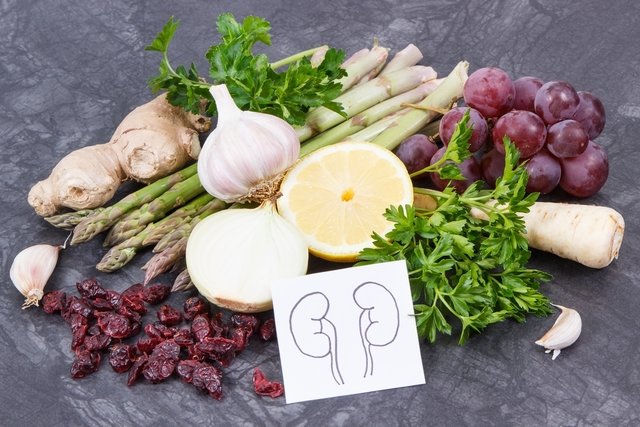In the hemodialysis diet, a treatment indicated to filter the blood, eliminating excess toxins, minerals and liquids from the body, it is essential to balance the intake of proteins, such as eggs, fish and chicken, to replace this nutrient that is lost during dialysis. , preventing the loss of muscle mass and weight.
Furthermore, it is also important to control sodium and fluid consumption, such as water, juices or teas to avoid fluid retention, which can overload the kidneys and promote the emergence of high blood pressure.
The diet for those undergoing hemodialysis varies according to current health status, body weight and individual nutritional needs. Therefore, before starting the diet, it is recommended to consult a nutritionist so that a personalized eating plan can be created.

The main dietary tips for those undergoing hemodialysis are:
1. Control the amount of proteins
The consumption of proteins, such as chicken, eggs, dairy products and fish, in the hemodialysis diet must be increased, to avoid losses of this nutrient, which generally occurs during treatment, thus preventing the loss of muscle mass and weight.
Protein intake varies according to kidney function and current health status, with 1.3 to 2 g of protein / kg of body weight per day being normally recommended. A person weighing 70 kg should consume between 91 and 140 g of protein, which corresponds to 200 g of grilled sardines + 1 boiled egg + 100 g of sheep’s cheese, for example.
2. Decrease potassium consumption
Depending on the levels of potassium in the blood, it may be necessary to reduce the consumption of this mineral to up to 2.5 g per day, as excess potassium in the blood can cause problems, such as muscle weakness and arrhythmia.
Therefore, the intake of foods rich in potassium, such as avocado, bananas, coconut water, nuts, instant coffee and legumes must be controlled in the diet. See a list of other foods rich in potassium.
To reduce the amount of potassium in food, you can also consume peeled and cooked fruits and vegetables, as cooking in water reduces the content of this mineral in food. See other tips for reducing the amount of potassium in food.
3. Decrease sodium intake
During hemodialysis treatment, it is essential to reduce sodium intake to avoid fluid retention and high blood pressure. Therefore, it is recommended that the consumption of the mineral is a maximum of 3 g per day, which is equivalent to 3 level teaspoons of salt.
To reduce sodium intake, it is important not to add salt to your food, avoid foods rich in salt, such as canned foods, fast food, ready-made seasonings and sausages, and use herbs, olive oil and vinegar to season your meals.
4. Control your fluid intake
Controlling fluid intake, such as water, teas, soups, juices and coffee, during hemodialysis treatment is important, because excess of these drinks can cause swelling, contributing to weight gain, shortness of breath and high blood pressure.
The recommended amount of water during hemodialysis treatment is 500 ml + the volume of urine in 24 hours a day. For example, if the volume of urine in 24 hours is 500 ml, then the intake should be 500 ml + 500 ml, totaling 1000 ml of fluids per day.
To control your fluid intake, you can use a bottle with measurements to measure the amount of water or tea during the day. Furthermore, avoiding foods with a lot of salt and sugar also helps control thirst and fluid intake throughout the day. Discover other suggestions for controlling your fluid intake.
5. Maintain adequate mineral consumption
During hemodialysis treatment, it is important to maintain adequate mineral consumption, according to blood levels, to avoid problems such as anemia, fractures and changes in heartbeat. The minerals that should be consumed in a balanced way are:
- Phosphor: Phosphorus levels in the blood may be high at this stage, which can cause bone fragility, fractures, joint pain, itching and changes in the heartbeat. Therefore, it is necessary to control the intake of foods rich in phosphorus, such as milk, cheese, beans and nuts, with a maximum intake of 1.2 g of this mineral per day generally recommended;
- Ferro: During hemodialysis sessions, the body loses small amounts of blood and, consequently, iron, which can cause anemia. Therefore, the doctor can often prescribe iron supplements to prevent anemia;
- Calcium: Although it is not necessary to restrict calcium in the diet, most calcium-rich foods also contain phosphorus. Therefore, to avoid calcium deficiency, the doctor may also recommend the use of supplements with this mineral;
- Vitamin D: During hemodialysis treatment it may also be necessary to use vitamin D supplements, in the form of tablets or injections, to improve calcium absorption.
To avoid excess or lack of nutrients in the body, the doctor and nutritionist constantly assess the levels of vitamins and minerals in the blood, helping to create a food plan suited to nutritional needs and individual preferences.
See nutritionist Tatiana Zanin for other dietary recommendations during hemodialysis treatment:

Sign up for our newsletter and stay up to date with exclusive news
that can transform your routine!
Warning: Undefined array key "title" in /home/storelat/public_html/wp-content/plugins/link-whisper-premium/templates/frontend/related-posts.php on line 12
Warning: Undefined array key "title_tag" in /home/storelat/public_html/wp-content/plugins/link-whisper-premium/templates/frontend/related-posts.php on line 13



